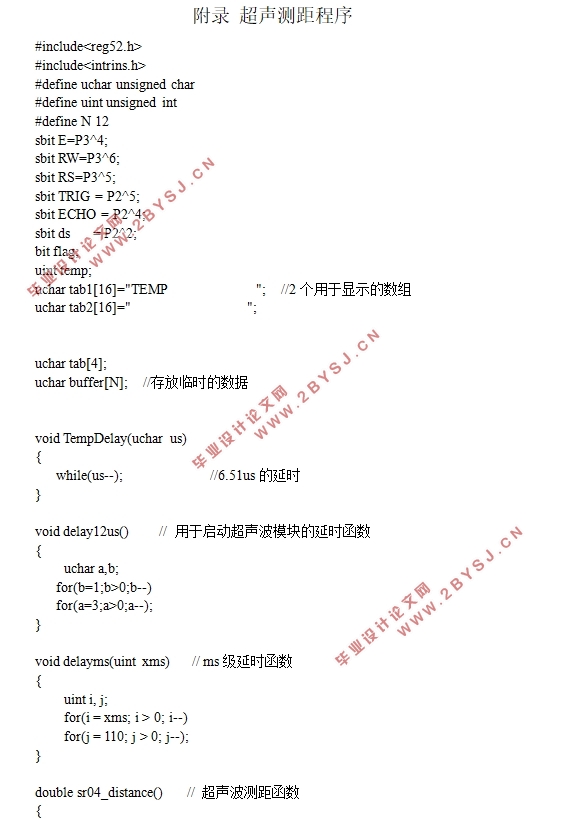基于单片机的超声波测距系统的研究(附程序代码)
无需注册登录,支付后按照提示操作即可获取该资料.
基于单片机的超声波测距系统的研究(附程序代码)(任务书,开题报告,论文12200字,程序代码)
摘要
当今,测控技术在军用、工业、民用中的应用变得越来越广泛。采用超声波法测量距离有着许多优点,其最大的特点便是非接触式测量方式,是一种无损的检测。因为超声波模块性能稳定和成本低的优点,较之激光和雷达的测距方法应用领域更加广泛,在倒车辅助系统、机器人避障、工件检测、超声医学等方面越来越广泛。所以说,超声波来测距的方法在近年来得到了越来越多的使用,本文介绍的是带有温度补偿的超声测距系统,根据发射超声波和接超声波之间的时间差来得知声波走两倍距离所用的时间。同时温度补偿声速,由以上参数进而得知待测目标的距离。
关键词:51单片机 超声波测距 无损检测 温度补偿
Ultrasonic Distance Measurement System Based on MCU
Abstract
Today, the measurement and control technology in the military, industrial, civilian applications become more and more widely. Ultrasonic measurement of the distance has many advantages, its biggest feature is the non-contact measurement method, is a non-destructive testing. Because of the advantages of stability and low cost of ultrasonic module, it is more and more widely used in reversing auxiliary system, robot obstacle avoidance, workpiece detection and ultrasonic medicine than laser and radar. Therefore, the ultrasonic distance measurement method has been used in recent years, more and more use, this paper describes a temperature compensation with the ultrasonic distance measurement system, according to the launch of ultrasound and ultrasonic time difference between the ultrasonic waves to know that twice Distance of time used. At the same time the temperature compensates the speed of sound, from the above parameters and then know the distance of the target to be measured.
Key Words: : 51MCU; ultrasonic ranging ; non - destructive testing ; temperature compensation


目录
摘要 I
Abstract II
第一章 引言 1
1.1研究现状 1
1.2 课题研究的目的和意义 2
1.3 研究思路和方法 2
1.4本章小结 3
第二章 超声测距综述 4
2.1超声波与超声传感器 4
2.1.1 超声波 4
2.1.2 超声波传感器 4
2.1.3超声传感器的主要参数如表2-1 6
2.2超声测距原理 6
2.3本章小结 7
第三章 硬件设计方案 8
3.1概述 8
3.2 超声波模块 8
3.1.1 超声波发射电路 8
3.2系统控制模块 10
3.3 晶振电路 11
3.4 复位电路 12
3.5 温度补偿电路 12
3.6 供电和下载电路 13
3.7 显示模块 14
3.8 本章小结 15
第四章 超声波测距的程序实现 16
4.1 开发工具介绍 16
4.1.1 Keil µVision 16
4.1.2 Altium Designer 16
4.2 主程序 17
4.2.1发射与接收 18
4.2.2 温度补偿程序 18
4.2.3数据处理程序 20
4.2.4显示程序 20
4.3 本章小结 23
第五章 超声波测距系统的实验 24
5.1实验目的 24
5.2 实验方法 24
5.3实验结果分析 25
5.4 本章小结 26
第六章 总结与展望 28
参考文献 28
致谢 29
附录 超声测距程序 30
